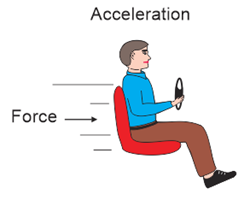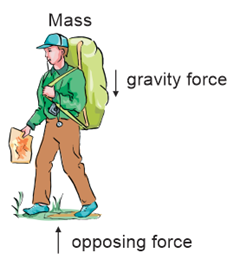Acceleration
Accelerometer means acceleration meter, but what is acceleration?
Probably the most common, every-day example is when a car speeds up. During a few seconds of acceleration, a car’s speed might increase from stopped to commute speed. The physics term for this is the change in velocity over time, which is also one definition of acceleration. A car’s speed also changes as it slows down, so that’s acceleration too.
A car speeding up is typically considered positive acceleration, and slowing down is negative acceleration.

Forces and Acceleration
Have you ever felt pressed into a seat back as a car accelerates? That’s the feeling of the car seat back applying force to you to make you accelerate in the forward direction. In physics:
force = mass × acceleration
...commonly noted as
F = ma
So, if you know the mass (m) and the force (F), you can calculate an object’s acceleration with a = F / m. That’s essentially what an accelerometer does when it measures acceleration - it measures the force applied to a known mass inside it.

Another force that causes acceleration in nature is gravity (g). Since our bodies have mass, we feel the force of gravity pulling us to the ground. The ground has to push back equally to prevent us from falling through or sinking in.

Newton's Second Law of Motion
Newton's second law of motion states that the acceleration of an object is directly
proportional to the applied force and inversely proportional to its mass.
a = F / m
To get from this to F = m×a, multiply both sides of a = F / m by m.
What’s the difference between force and mass?
Your mass is all the protons, neutrons, and electrons in your body. Your weight is a measure of how much downward force your feet apply to a scale when you stand on it.
When you weigh yourself on the earth, that’s one value because the earth’s gravity is acting on your mass. If you weighed yourself on the moon, your mass would not change, but your weight would be less. In other words, your body would apply less force on the scale. That’s because the moon has less mass than the earth, so its gravitational pull is weaker.
